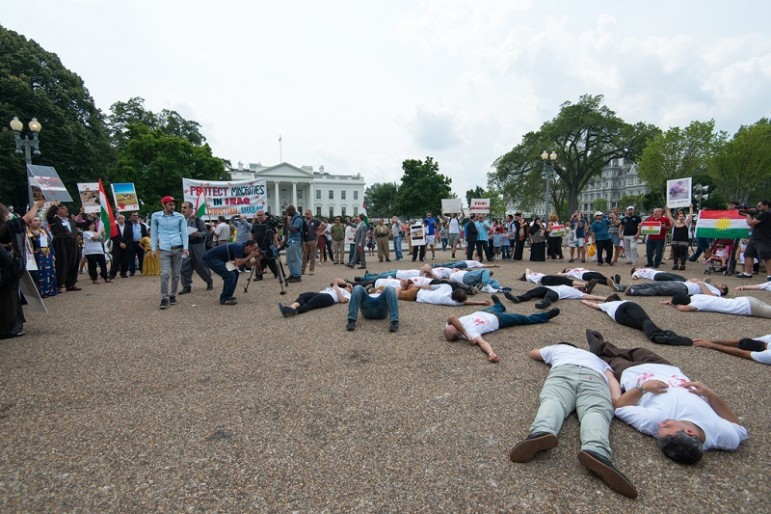
December 20, 2015; Time Magazine
In the midst of our coverage of the reactions positive and negative to accepting crisis-torn refugees into the United States, we’ve noticed the media as a whole has devoted less time to discussing the situation causing the mass exodus out of the Middle East. Many wish not to know exactly what ISIS is doing. The few media outlets that have covered the personal stories of those escaping ISIS captivity have detailed the brutal reality of an unfolding of the mass genocide of the Yazidi people. Spotlighting those stories is vital and they may change the tune of those politicians and public figures that have turned their backs on the refugees.
The Yazidi (or Yezidi) people in Iraq are largely ostracized by their society. As they do not follow Islam, they are a religious minority in Iraq, a fact used to justify torture and rape against them. Nadia Murad Basee Taha, an Iraqi young woman of Yazidi ethnicity, was one of thousands of women who have been sold into slavery for the ISIS militants. While she escaped, her family and thousands of others are still trapped in refugee camps or with ISIS. The situation may well be seen as a genocide of the Yazidi people.
To help them, Nadia is working with the U.S.-based nonprofit Yazda, which helps support escaped Yazidi women. She visited New York to speak at the U.N. Security Council and tell them her story. While she could not save her family members, Nadia is trying to bring attention to exactly what ISIS is doing in Iraq and Syria to, perhaps, help others.
Nadia’s story is detailed in the Time article, and it is disturbing. ISIS believes in institutional slavery and “corrective rape” of non-Muslim women. It is estimated that approximately 3,400 people are still held by ISIS, most believed to be women. Men are either killed or converted into militants themselves. Nadia was sold and repeatedly raped before she escaped.
Not everyone is ignoring the Yazidi people’s plight. Politico ran a powerful story in early October about the desperation of the situation. The author, a Yazidi woman herself, contends that ISIS rapes girls as young as eight years old and many girls and women are sold multiple times to be serially abused and sexually assaulted by militants.
Sign up for our free newsletters
Subscribe to NPQ's newsletters to have our top stories delivered directly to your inbox.
By signing up, you agree to our privacy policy and terms of use, and to receive messages from NPQ and our partners.
“Slowly but surely, I and a determined group of people are getting Yazidi prisoners out of this nightmare,” writes Vian Dakhil for Politico. “There are some volunteers willing to go into ISIS-controlled areas to save those girls and help them all get back safely to Iraqi Kurdistan. With no help from any government, we’ve been able to rescue 2,150 of the 5,840 Yazidi men, women and children who were taken prisoner—800 of them young girls.”
These stories of horror parallel those from some of the refugees looking for passage into the United States fleeing the Nazi holocaust of the 1940s, a comparison many have already made, including us at NPQ. As noted by Amy Butcher, “America only backpedaled on its anti-refugee stance and took action to rescue Jews in 1944 once the full horrors committed under the Nazis came to light.” But it’s also known that many people knew of the inhumane acts that were being performed long before any formal action was taken, including officials in the Western world and German citizens. The Red Cross, which provided humanitarian aid during the war, admitted decades after the Holocaust that it knew about the concentration camps but felt powerless to speak up.
“The International Committee of the Red Cross has shared responsibility for the silence of the world community,” said Georges Willemin, the organization’s archivist, to the New York Times in 1996. “Could we have gone further? Could we have done more? I don’t know.”
In part, the Red Cross said it needed to maintain neutrality in the war in order to assist prisoners in war camps for both sides. When Willemin was asked why it took so long for the Red Cross to admit what it knew, he said, “Because it takes time to face your own history.”
It’s hard to imagine that the politicians who have so strongly resisted accepting refugees don’t know what’s happening, but there is the same unwillingness and forced silence we saw 70 years ago. In the very beginning, the Western world refused to believe Adolf Hitler would try to annihilate an entire population of people. With ISIS, there can be no moment of disbelief. There are videos, there are eyewitnesses, and there is an ever-aware media. Even if they continue to maintain their ignorance, the media must continue to publish as many firsthand accounts and direct reporting from these countries as possible to tell the stories of the refugees trying to find the haven we didn’t provide years ago.—Shafaq Hasan











